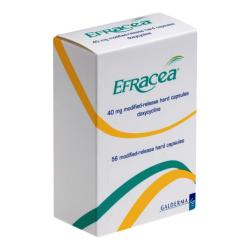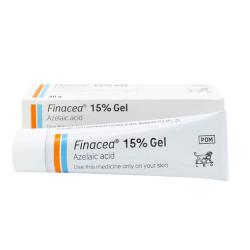Login to your account
- Prescription included
- Genuine medication
- All-inclusive service - No hidden fees
- Free next-day delivery
Rosacea
Get rosacea medication with an online prescription
Rosacea is a common skin condition that is estimated to affect 415 million people worldwide. It is a chronic (long-term) condition that causes redness and dilated blood vessels in the face. Although the condition is not completely curable, its symptoms can be improved through an appropriate treatment plan.
What is rosacea?
The first signs of rosacea usually involve facial flushing and skin irritation, but can also involve dilated blood vessels and small bumps that may be mistaken for acne. Inflammation and irritation of the eyes and eyelids are another symptom of rosacea. It typically affects the cheeks, forehead, chin and nose. Rosacea symptoms can fluctuate in severity and may get worse with certain triggers.
What are the different types of rosacea?
There are four different types of rosacea, although you may have more than one and symptoms can often overlap.
- erythematotelangiectatic rosacea - the most common type of rosacea, this is characterised by persistent redness in the face, which may also be accompanied by a feeling of warmth as well as a stinging or burning sensation
- papulopustular rosacea - this type involves papules (red bumps) and pustules (pus-filled bumps) that are often mistaken for acne
- phymatous rosacea - this rare type of rosacea appears more frequently in men and usually affects the nose (however it can also affect the forehead and chin), leading to thickening and scarring of the skin
- ocular rosacea - this form affects the eyes, leading to blurry vision, dryness and irritation
There are effective treatment options available for all forms of rosacea.
What causes rosacea?
The causes of rosacea are not fully understood, although it is thought that genetics, environmental factors and the immune system all play a role. Rosacea is experienced more frequently by women and people with lighter skin, however men may experience more severe symptoms.
The severity of the condition varies, and can worsen as a result of exposure to certain triggers.
Common triggers include:
- aerobic exercise
- hot or cold temperatures
- alcohol
- hot drinks
- spicy foods
- cheese
- caffeine
- stress
- sunlight
Some medications, such as vasodilators, may also worsen rosacea, as they dilate the blood vessels. There may also be a link between rosacea and smoking, although further research is needed to establish a cause.
You can reduce the frequency of flare-ups by identifying and avoiding potential triggers.
What are the symptoms of rosacea?
Rosacea usually begins with episodes of flushing, where the skin turns red for short periods of time.
Other symptoms of the condition can include:
- permanent redness in the middle of the face
- small blood vessels on the nose and cheeks becoming more visible
- papules and pustules - swollen red bumps that look like acne
- an enlarged nose - rosacea can cause the skin on the nose to thicken, making it appear bulbous
- eye problems - rosacea can be accompanied by swelling and irritation of the eyes and eyelids

What treatments are available?
While there is not a cure for rosacea, treatment can help reduce symptoms. This may involve a combination of medication and self-help techniques.
Topical treatments
Topical treatments, often available as creams or gels, can reduce redness and spots associated with rosacea.
Common treatments include:
- azelaic acid, which works by decreasing redness and swelling of the skin - this is available under the brand name Finacea
- metronidazole, a topical antibiotic that can treat the acne-like breakouts and redness that accompany rosacea
- brimonidine, a medication specifically developed to reduce redness of the face in rosacea
Oral medications
If you have moderate to severe rosacea with red bumps, your doctor may prescribe an oral medication. Oral medications may include acne treatments or antibiotics.
Acne treatments like isotretinoin, known more commonly by the brand name Roaccutane, can help reduce redness as well as the appearance of pustules and papules. However, as this medication can have very severe side effects, it may not be appropriate for everyone.
Oral antibiotics, such as tetracycline, minocycline and doxycycline, can help decrease inflammation, reducing redness in those with rosacea. However, long-term use of antibiotics can cause negative side effects, such as alterations in gut bacteria that can lead to stomach problems. Overuse of antibiotics is also associated with antibiotic resistance, a serious issue which is causing antibiotics to become less effective, meaning that small infections may one day be untreatable through antibiotics.
Low-dose doxycycline is often prescribed for rosacea as it does not affect the microbiome as much and it is not associated with the development of antibiotic resistance. euroClinix offers Efracea, a low-dose doxycycline treatment that has been specifically formulated to treat rosacea.
Light therapy
If your skin is persistently red or if you have visible blood vessels, laser treatment and other light-based therapies may be effective, with many people undergoing this form of treatment experiencing a long-term reduction in symptoms. However, light-based therapies can be expensive, with multiple sessions needed to see results. They also come with the risk of serious side effects, such as burns, skin discolouration and scarring.
Self-help techniques
In addition to medication, you can take care of your skin and avoid flare-ups by:
- identifying and avoiding triggers
- protecting your skin from sun exposure by wearing sunscreen daily
- using gentle skincare products that do not contain alcohol or fragrances
- not wearing makeup or contact lenses during a flare-up if you have ocular rosacea
- not rubbing or touching your face excessively
It can also be beneficial to test new products before using them. You can apply a small amount of product on an area of rosacea-prone skin and leave it for 72 hours to make sure you do not experience any adverse reactions.
Can I buy rosacea treatment online?
If you have rosacea, you can purchase treatment online from euroClinix.
To order online, you will first need to complete a quick and easy consultation to ensure that the treatment is suitable for you, which will be reviewed by one of our doctors. If approved, they will issue a prescription to our pharmacy, where it will then be sent to your chosen delivery address with next-day delivery.
Select
medicationFill out a short
medical formDoctor issues
prescriptionMedication sent
from pharmacy


